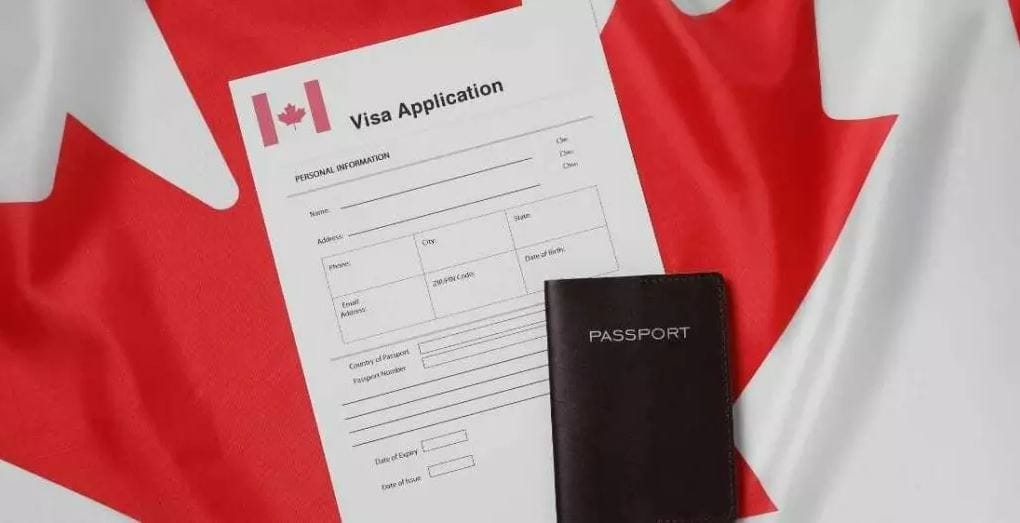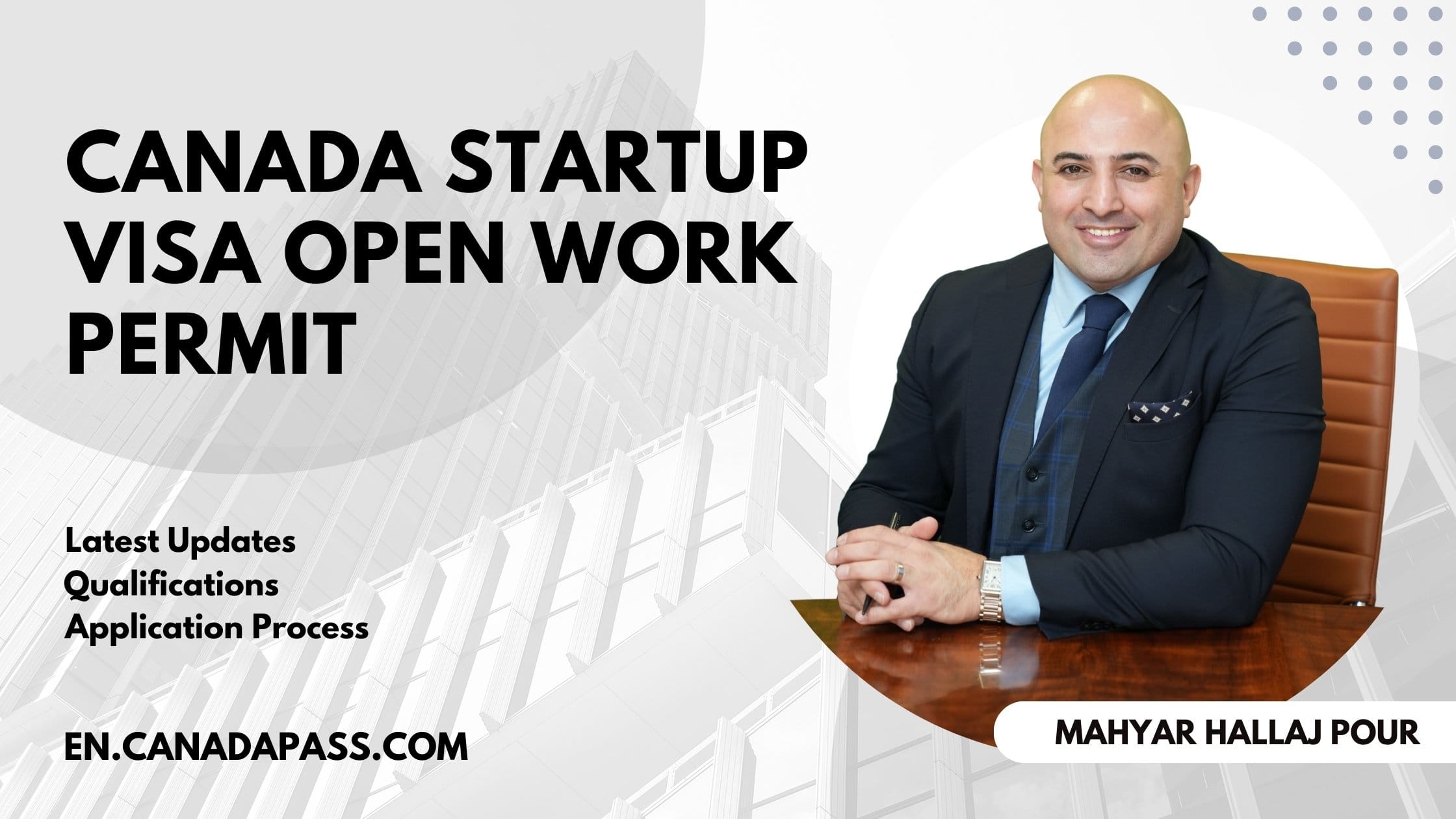Disclaimer: Please note that the Government of Canada’s Start-Up Visa (SUV) Program is currently closed to new applications. Immigration, Refugees and Citizenship Canada (IRCC) stopped accepting new SUV permanent residence applications at 11:59 p.m. on December 31, 2025, with limited transitional exceptions only for applicants who obtained a valid commitment from a designated organization in 2025 and who must file by June 30, 2026. In addition, new applications for the optional SUV-linked work permit are no longer being accepted as of December 19, 2025.
If you’re an entrepreneur aiming to launch an innovative business in Canada and secure a permanent residency, the Start-Up Visa Program is an exceptional opportunity. This unique immigration pathway of Business Immigration not only supports the growth of your new venture but also provides a direct route to PR for you and your family.
This comprehensive guide offers you everything you need to know about business immigration to Canada through the Start-Up Visa such as eligibility and application steps to benefits.
What is the Canada Start-Up Visa Program?
- The Canada Start-Up Visa (SUV) Program is an immigration pathway for permanent residency (PR) designed to attract innovative entrepreneurs.
- The program focuses on ventures with strong potential for innovation, scalability, and job creation.
- Up to five co-founders may apply under a single Start-Up Visa application, provided they collectively meet the ownership criteria.
Why Choose the Start-Up Visa Program?
- Pathway to Permanent Residency — even if your start-up doesn’t succeed, your immigration status remains unaffected.
- Connection to Canada’s Vibrant Business Ecosystem — gain access to networks of investors, mentors, and accelerators that can help your business grow.
- Industry Flexibility — no limitations on the type of industry, allowing entrepreneurs from diverse sectors to qualify.
Eligibility Criteria for Canada Start-Up Visa Program
To be eligible for the Canada Start-Up Visa Program, applicants must meet the following requirements as per the official guidelines provided by the Government of Canada.
1. A Qualifying Business
- Innovative business idea
- Job creation for Canadians
- Global scale potential
2. Letter of Support
Applicants must get a Letter of Support from one of the following designated organizations:
- Venture Capital Funds
- Angel Investor Groups
- Business Incubators
3. Language Proficiency
The minimum language requirement for a Canada Start-Up Visa is Canadian Language Benchmark (CLB) 5 in either English or French.
4. Sufficient Settlement Funds
Applicants must demonstrate sufficient funds to support themselves and any accompanying family members upon arriving in Canada. The necessary settlement funds depend on family size.
5. Admissibility
Applicants must submit evidence, including medical and police clearance certificates, demonstrating that they do not pose a threat to Canadian society. 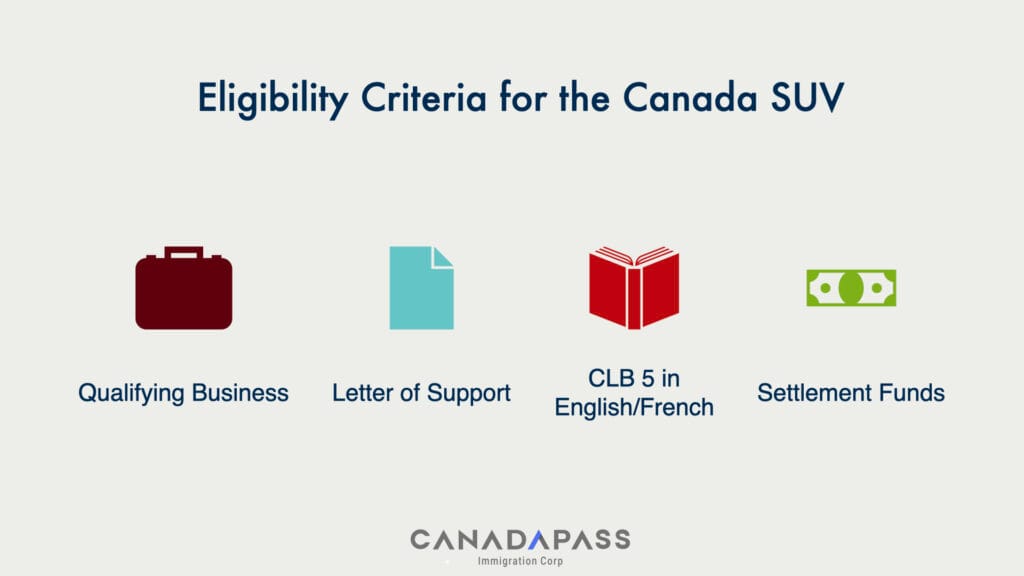
Designated Organizations for Canada Start-Up Visa Program
Designated organizations are approved Canadian business groups authorized by the government to support foreign entrepreneurs through the Start-Up Visa Program. To apply for a Start-Up Visa, applicants must secure support from at least one of the designated organizations listed below:
- Venture Capital Funds with a commitment of at least $200,000
- Angel Investor Groups with a minimum investment of $75,000.
- Business Incubators
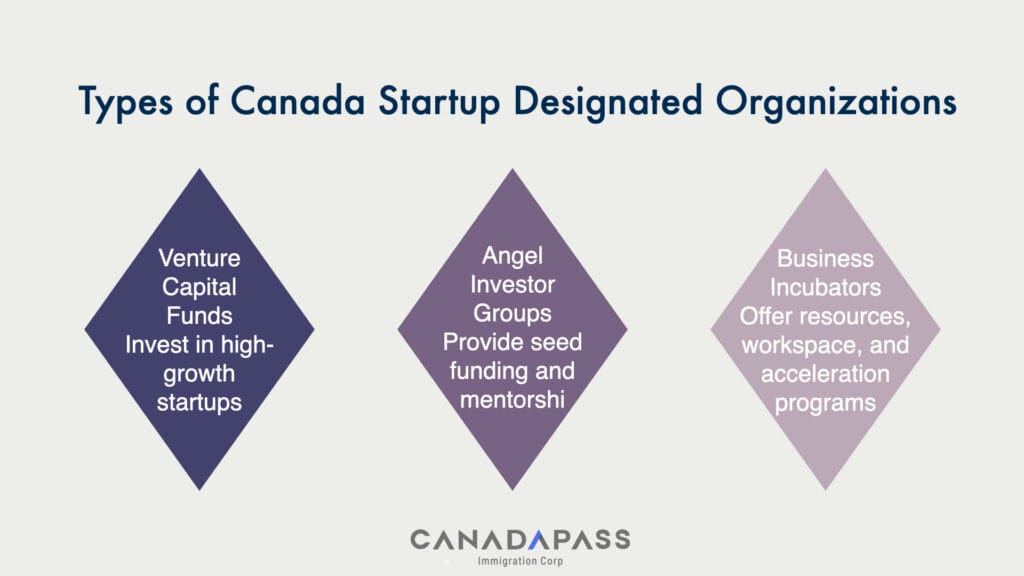
To get a Letter of Support, you’ll need to:
- Reach out to a designated organization to learn about their support process
- Present a strong business idea that earns their backing
- Obtain a Letter of Support from the organization
Applications are currently prioritized if they receive backing from:
- Venture capital funds
- Angel investor groups
- Business incubators that provide committed capital
- Organizations recognized as part of Canada’s Tech Network
How to Apply for the Canada Start-Up Visa Program
Step 1: Develop a Solid Business Concept
Start by developing a robust, scalable business idea with global potential. Understand your target audience, analyze your competitors, and identify what sets your business apart.
Step 2: Secure a Letter of Support
Each organization has specific criteria, making it essential to research their past investments, focus areas, and mentorship styles. If they recognize significant potential, they will issue a Letter of Support, an essential requirement for your Start-Up Visa application.
Step 3: Prepare All Required Documents
Gather all necessary documents, including your Letter of Support from a designated organization, proof of language proficiency at CLB level 5, evidence of settlement funds, a detailed business plan, and any additional documents listed on the IRCC website.
Step 4: Submit Your Application
Create an online profile on the Permanent Residence (PR) Portal under Start-Up Business Class. Complete application forms, upload all required documents and pay the application fees.
Step 5: Apply for an Open Work Permit (Optional)
While your permanent residence application is under review, you may apply for a Startup Visa Open Work Permit to start developing your business in Canada. This work permit enables you to actively manage and oversee key aspects of your start-up.
Step 6: Business Progress Updates
Regularly update IRCC on your progress by highlighting visible achievements such as customers, signed contracts, or team expansion. This demonstrates your commitment and can enhance your chances of permanent residence approval.
Step 7: Receive a Decision
Once your application is assessed, IRCC will inform you of their decision using the contact information you provided. If you are successful, you and your family members will be granted permanent residency.
Benefits of the Canada Start-Up Visa Program
The Canada Start-up Visa offers endless benefits for entrepreneurs, such as:
- Direct pathway to permanent residency for main applicants and their families
- Access to resources, the startup ecosystem, and business networks in Canada
- Be able to get an open work permit with a 3-year validity
- The strong connection of Canada with international markets
- Multicultural and friendly Canadian society
Funding and Financial Planning for Start-Ups in Canada
Securing funding is integral to your start-up’s success. Here’s how you can prepare:
Potential Sources of Funding
- Personal Investment: Using your own money shows commitment and allows you to maintain full control.
- . Investment from Venture Capitalists or Angel Investors.
Financial Considerations
- Evaluate living costs in your target city.
- Budget for operational expenses and business investments.
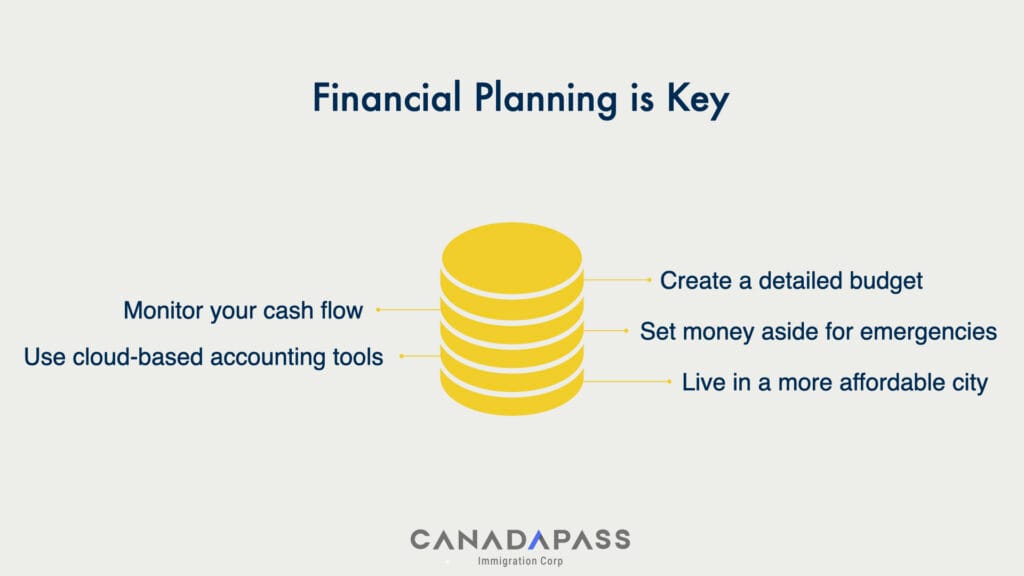
Life in Canada as a Foreign Entrepreneur
Best Cities for Start-Ups
- Toronto:. provides startups with funding, mentorship, and networking opportunities.
- Vancouver: Vancouver’s strategic location on the Pacific Rim, along with its booming tech industry and sustainability-driven culture, makes it ideal for businesses with international ambitions.
- Montreal: Montreal is a leader in AI and R&D. With affordable business costs, a multilingual workforce, and strong institutional support.
- Calgary: Calgary is now a place for clean technology and entrepreneurship. The city offers competitive business costs and strong support for startups looking to innovate in sustainability and beyond.
- Quebec: Quebec has become a hub for innovation and entrepreneurship, particularly for those leveraging the Quebec Startup Visa pathway. The province offers competitive business costs, a thriving ecosystem for clean technology, and robust support for startups aiming to innovate in sustainability and other high-growth sectors.
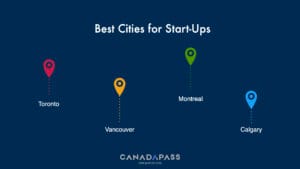
Cost of Living
| City name | Living cost |
| Toronto | $2,000 per month. |
| Vancouver | $2,500 per month |
| Montreal | $1,500 per month |
| Calgary | $1,800 per month |
Networking and Growth Opportunities
- Clean Energy & Sustainability: Backed by government incentives, tax credits, and public-private partnerships, the sector is a good choice for innovative businesses.
- Technology & Artificial Intelligence (AI): Canada is a global leader in AI, supported by major investments and national strategies.
- Healthcare Innovation: Canada’s healthcare sector is being reshaped by digital technologies,
- Agriculture & AgriTech: Canada is modernizing agriculture with smart technologies and sustainable methods to meet rising global food demands.
Top Start-Ups in Canada in 2025
| Startup | Founded year | Valuation | Area |
| Hootsuite | 2008 | $1 billion | Management platform |
| CoHere | 2019 | $2.2 billion | AI |
| Kik Interactive | 2009 | $1 billion | Messaging app |
| Lightspeed POS | 2005 | $3 billion | Point-of-sale software |
Is the Canada Start-Up Visa Right for You?
This program is ideal if you have an innovative business idea, aim to expand globally from Canada, and wish to gain permanent residency while building your startup.
If you want to get Canada permanent residency under the Start-Up Visa, take the first step today to find your eligibility through a free CanadaPass assessment form. Our experts provide specific and useful services and consultations to help you achieve a successful immigration journey to Canada.


